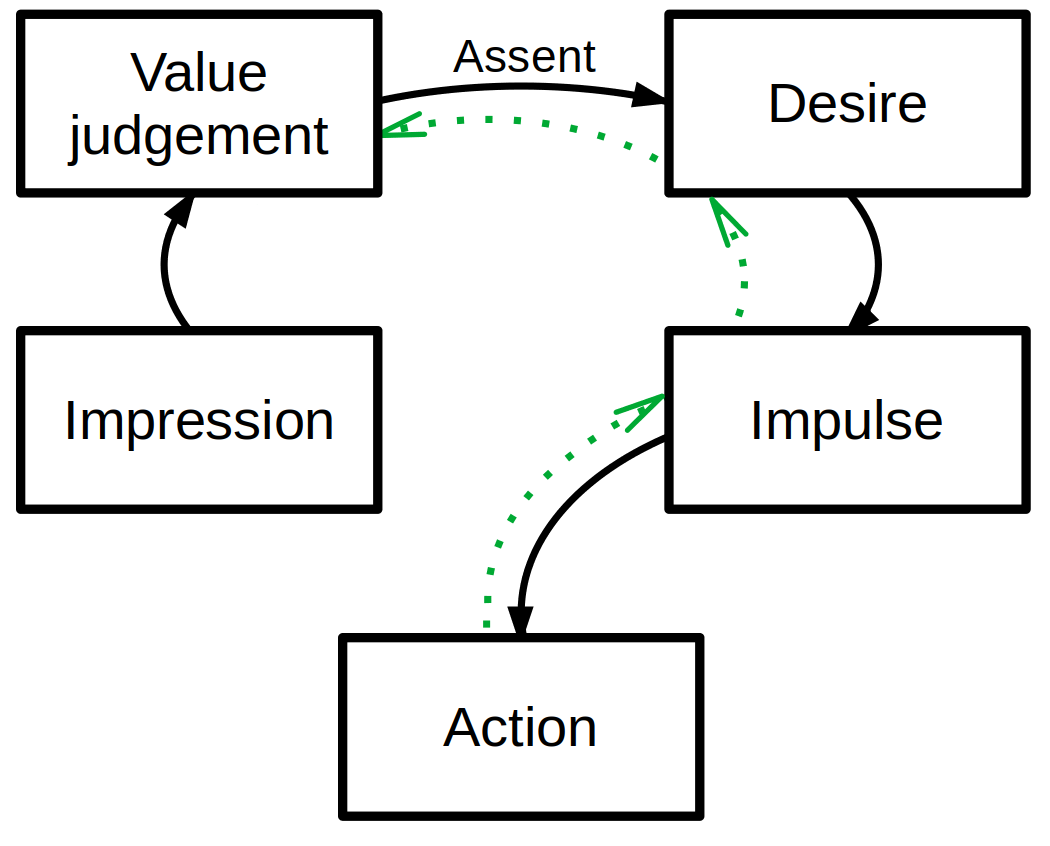Category: Virtue ethics
Epistemic status: Core Stoic teachings.

In 1739, David Hume released “A Treatise of Human Nature”. Here’s a passage from the book:
”In every system of morality, which I have hitherto met with, I have always remarked, that the author proceeds for some time in the ordinary way of reasoning, and establishes the being of a God, or makes observations concerning human affairs; when of a sudden I am surprised to find, that instead of the usual copulations of propositions, is, and is not, I meet with no proposition that is not connected with an ought, or an ought not.”
Put in simpler terms: moral arguments tend to jump from “is”/”is not” to “ought”/”ought not”. This is known as the “Is–ought problem”; how do you go from facts about the world to value judgements about the way things ought to be?"
According to Stoic teachings, people habitually jump to “oughts” in ways that don’t serve them. This post will be about The Discipline of Assent, a Stoic practice that is all about rejecting unskillful “oughts”.1
But first, let’s dive into Epictetus’ “Enchiridion”, and talk about a core Stoic concept that underpins skillful ought-ing.
The Dichotomy of “Control”
The first paragraphs of Epictetus’ “Enchiridion” is commonly referred to as “the dichotomy of control”:
Some things are up to us and others not. Things up to us are opinion, pursuit, desire, aversion, and, in a word, whatever are our own actions. Things not up to us are body, property, reputation, command, and, in one word, whatever are not our own actions.
The things up to us are by nature free, unrestrained, unhindered; but those not up to us are weak, slavish, restrained, belonging to others.
Remember, then, that if you suppose that things which are slavish by nature are also free, and that what belongs to others is your own, then you will be hindered. You will lament, you will be disturbed, and you will find fault both with gods and men.
But if you suppose that only to be your own which is your own, and what belongs to others such as it really is, then no one will ever compel you or restrain you. Further, you will find fault with no one or accuse no one. You will do nothing against your will. No one will hurt you, you will have no enemies, and you not be harmed.
- Epictetus, The Enchiridion
Note: Some people misinterpret this passage (hi, past me!). I’ve written about this before. Check this footnote for more info=2
This paragraph requires some unpacking. Epictetus starts by dividing existence into things “up to us” (=internals) and things “not up to us” (=exernals). Internals are part of our cognitive machinery, the juicy bits relevant to virtue. The externals are everything else, including our health, stuff, loved ones, house, etc.
Then Epictetus goes on to say that only the internals truly belongs to us. Everything else can be taken away,3 controlled, and used to shackle us.4 Therefore, he warns us to not mistakenly think that external things are “ours”.
This is related to the is-ought distinction! If you keep externals at the “is”-level, and avoid attaching “oughts” to them, you will save yourself a lot of trouble. “Oughts” should be reserved for internal things, as in “you ought to embody virtue!”. As Epictetus says in the quote:
But if you suppose that only to be your own which is your own, and what belongs to others such as it really is, then no one will ever compel you or restrain you. Further, you will find fault with no one or accuse no one. You will do nothing against your will. No one will hurt you, you will have no enemies, and you not be harmed
If you want the world to be in certain ways, it’s very easy to slip into delusion and a coercive mindset. If people “should” behave differently than they do, punishment and anger are close at hand. If the world “should” be fairer, it’s easy to slip into denial as a way to handle cognitive dissonance.
If you want to act with skill, and have a healthy relationship with the world, you might want to embrace the Stoic ideal of equanimity: calmly accepting the world as it is. Moving towards a state of equanimity is one of the goals of Stoic practice. Getting there requires re-calibrating your cognitive machinery through steady practice.
Equanimity is not the same as repressing emotions,5 nor is it about withdrawing from worldly affairs. Equanimity is a state where unskillful emotions never arise in the first place, a state where you can move skillfully towards Justice from a place of joy and determination.
But we’re skipping ahead. Let’s get practical and talk about an equanimity-enabling practice! It’s time to talk about The Discipline of Assent.
The Discipline of Assent
In traditional Stoic thinking,6 impressions (=sensory inputs) and Actions are connected through a cascade of mental movements. The cascade starts with an impression. The impression is decorated with a value judgement, turning the "is" into an "ought". When you become aware of a value-judgement-decorated impression, you can either accept or reject the value judgement.
This accepting-or-rejecting is the focus of The Discipline of Assent.

Untrained people habitually accept value judgements as objective truths about reality. As you practice the Discipline of Assent, you will gradually increase your capacity to consciously accept/reject value judgements. Over time, the direction of your assent will shape what value judgements appear in the first place. Given enough practice, all your value judgements will align with virtue.7 Focusing on the value judgements rather than the resulting actions enables you to get to the root of your unskillfulness, averting fuck-ups before they start to tempt you.
Whenever externals are more important to you than your own integrity, then be prepared to serve them the remainder of your life. Epictetus, Discourses 2.2.12.
In order to make this all more concrete, let’s think of some common impressions and the value judgements people commonly decorate them with:
I added the face-slap part because I found it funny to reference BDSM. But the reference carries an important truth: value judgements are very flexible. Some people don’t like physical touch, rejecting massages as BAD. Some people like getting slapped, something usually considered unpleasant. Is rain necessarily bad, or can it be pleasant to feel the drops landing on your skin?8
If you suffer distress because of some external cause, it is not the thing itself that troubles you but your judgement about it, and it is within your power to cancel that judgement at any moment. - Marcus Aurelius, Meditations 8.47
Back-tracing
You will stumble repeatedly. This is great. Every time you act unskillfully, you get information that you can use to improve your virtue-alignment. Every time you fuck up, I recommend back-tracing the unskillful Impression→Action cascade.
If you act in a way someone you respect wouldn’t,9 try to find the preceding desire, narrative, or value judgement. If you desire things that are bad for you(r virtue), think about the ideas that led you to the desires.
Most of these Impression→Action cascades are ingrained habits you execute habitually. Increasing your agency in these aspects requires steady work, particularly when the ingrained habits have been reinforced by malicious actors that are out to get you.
Habits are usually supported by some kind of narrative that explains why certain externals are good or bad. If you spend your evenings surfing facebook instead of resting, do you have a narrative of “wanting to enjoy yourself”? If you react in anger when your computer has issues, do you have a narrative that “it should work”? If you feel lonely, do you have a narrative that “you shouldn’t be alone”?
Most (if not all) moments of unskillfulness can be traced back to unskillful value judgements like these. Happy back-tracing!
I spend a lot of time researching stuff for this post. T’was a long time since I worked on the fundamentals, and I wanted to make sure I didn’t misrepresent. Not sure if I succeeded.
Sometimes, this passage is translated in a slightly misleading way, with “eph’ ēmin” (=“up to us”) being translated as “in our control”. The word “control” can be interpreted in incorrect ways, due to its connotations.
“Control” is often interpreted as “complete voluntary control.” Without rigorous training, voluntary control breaks down in the face of mental health issues, strong stress and similar. For most people, control isn’t absolute even in common everyday life.
As such, it’s misleading to claim that one’s thoughts, feelings and action impulses are within (active, voluntary) control. Diligently practising virtue ethics is one way to increase your level of active voluntary control, but seeing it as a given for an untrained mind is deluding yourself.
You could argue that the things “up to us” can be taken away by dementia etc. And then you could argue that “you” wouldn’t really be “you” if you get dementia. But that’s not a constructive chain of reasoning. I’d prefer it if you don’t get dementia anytime soon, hope the universe agrees <3
Besides doing philosophy, Epictetus was a slave. He probably knew a lot about what could be taken away…
Though this is a risk for sure!
Lots of inspiration from https://traditionalstoicism.com/the-path-of-the-prokopton-the-discipline-of-assent/
Aka Sophrosyne. See Vervaeke & Ferraro 2013
Separating reality from value judgements is a core part of nonviolent communication. Usually talked about in terms of “observations” vs “feelings”/”reactions”/”judgements”
or feel an urge to





